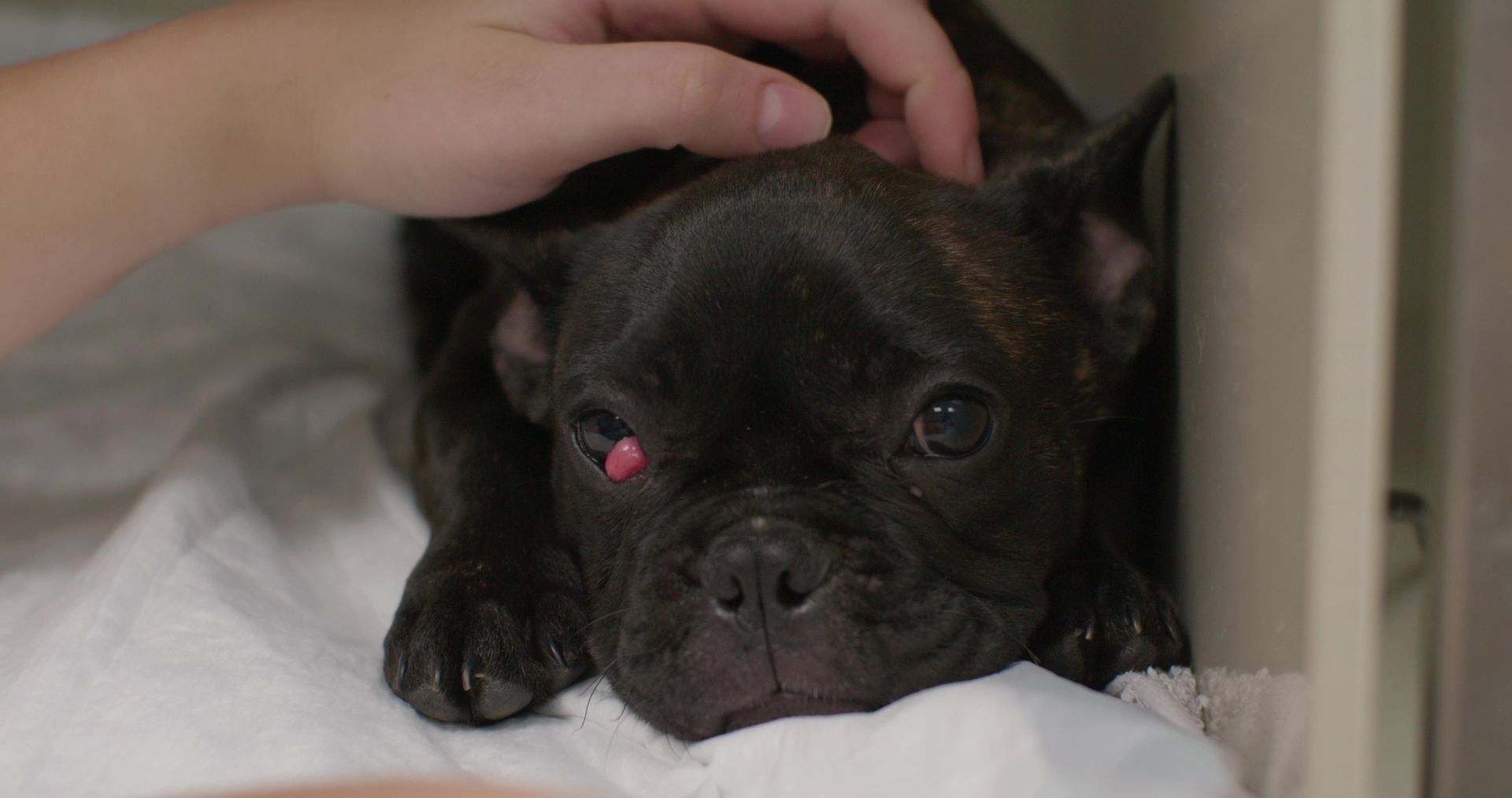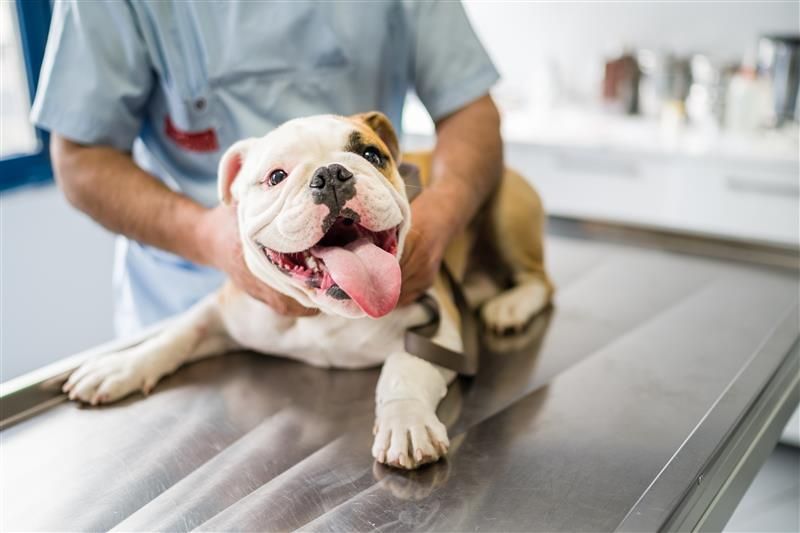6 Biggest Bulldog Health Problems Owners Should Know About
Bulldogs are loved worldwide for their affectionate, loyal nature. Gentle with adults and children alike, they’re often seen as the ideal family pet.
However, there are a few things all new and prospective bulldog owners should know.
Because of their unique anatomy – flat face, stocky build, and thick skin folds – bulldogs are at risk of developing a wide range of health conditions.
In this blog, we’ll explain the six most
common bulldog health issues and how they’re best managed, from simple at-home tips to professional support at Sydney Bulldog Clinic.
Early intervention and care can help prevent serious problems. Call us on (02) 8811 4604 to book a bulldog health assessment today!
1. Breathing Issues
One of the most widespread
bulldog health conditions is brachycephalic obstructive airway syndrome (or BOAS).
BOAS is a respiratory disease found exclusively in flat-faced dogs like bulldogs. Their short snouts, thickened and elongated soft palates, excessive tissue in the throat and nasal cavity, protruding lower jaw, and overcrowding of teeth can cause extreme difficulty breathing.
Symptoms include laboured or rapid breathing, loud snoring, snorting, gagging while eating, digestive issues such as vomiting, and sleep apnoea.
BOAS surgery from about 12 months of age is the only treatment option that offers real relief – a 90% chance of significant improvement, in fact. It involves widening the nostrils, shortening and thinning the soft palate, and removing excess tissue (and possibly tonsils) to increase airflow.
2. Joint & Skeletal Conditions
Orthopaedic bulldog health problems are also very common.
Their stocky build and short legs can place a lot of strain on joints, leading to cruciate ligament injuries, patella luxation, elbow and hip dysplasia, and spinal abnormalities. If left untreated or unmanaged, bulldogs are likely to develop arthritis in their older age.
Limping, stiffness, swelling or tenderness, difficulty standing, walking, or playing, and lameness can all be signs of joint stress.
Joint supplements and medications can be helpful; however, in many cases, they aren’t effective or appropriate. In these scenarios,
bulldog orthopaedic surgery is the best way to fix orthopaedic damage. Common procedures include fracture repairs, tibial plateau leveling osteotomy (TPLO) surgery for cruciate ligament repair, medial patella luxation (MPL) surgery for kneecap stabilisation, juvenile pubic symphysiodesis (JPS surgery) for hip joint corrections, and elbow surgery to improve leg function.

3. Eye Problems
Another of the bulldog health concerns owners should be aware of is eye conditions, as their big, round eyeballs are prone to congenital abnormalities, injuries and infections.
The most prevalent is cherry eye, where the third eyelid gland prolapses and a red lump forms in the corner of the eye. Others include dry eye, corneal ulcers, the abnormal growth of eyelids and eyelashes, glaucoma, and cataracts due to age.
Symptoms to look out for are inflamed or gunky eyes, excessive blinking or squinting, rubbing of the eyes, or vision impairment (i.e., bumping into things).
A serious case may require
bulldog eye surgery to relieve discomfort, restore vision, and prevent further damage. If the issue is minor, medications can often be prescribed by a vet to manage symptoms.
4. Allergies
Allergies can present in a few ways in bulldogs. The most common are skin infections like skin fold pyoderma and dermatitis. These occur when moisture and bacteria become trapped in a bulldog’s wrinkled skin.
Their narrow airways and ear canals make them susceptible to environmental irritants like pollen and dust mites, too, whilst their sensitive immune systems can cause them to be intolerant of some foods.
Itchy skin, rashes, foul odours, lumps, hair loss, red, watery eyes, sneezing, and excessive licking or scratching can all be signs of an allergic reaction.
To treat chronic
bulldog allergies, keep your dog away from known triggers. For the skin, thorough cleaning and drying, and the use of dog-safe wipes or topical creams, will help control symptoms. In many cases, additional medications are required to reduce allergic inflammation and reduce itchiness the help them feel comfortable. For respiratory relief, vet-prescribed medications like steroids or antihistamines can help.

5. Heat Stress
Hot weather is not a friend to the bulldog. Their short snouts make breathing in humid conditions difficult, and their thick skin also makes it hard for them to regulate their body temperature.
This is why heat stress, or heat stroke, is a common problem. Obviously, the warmer months are particularly risky; however, many heatstroke cases occur in warm weather at the beginning of Spring when our dogs are not used to the heat and we are not expecting it!.. If your bulldog is lethargic, panting excessively, has laboured breathing, or collapses, they need urgent help.
Give them plenty of fresh water to drink and keep them in a cool area near an air-conditioner or in the shade. Apply a wet flannel to their face, paws and armpits. If you have access to one, a shallow kiddie pool is perfect for them to stand in and cool down.
If they don’t improve after 10-15 minutes, you should seek emergency veterinary care.
6. Obesity
Rounding out the common health problems of bulldogs is obesity.
Their sedentary lifestyle and love of food mean that they can gain weight easily, exacerbating other issues such as breathing difficulties, joint strain, skin conditions, and heat intolerance.
However, their short, stocky build can make it hard to tell if they are overweight or obese. You need to examine their body, checking that you can feel their ribs under a thin layer of fat, and that their abdomen is “tucked up” from the rib cage to the hind legs. Fat pads between their legs or on the top of their hips can be a sign of obesity.
To keep bulldogs healthy, avoid overfeeding (i.e., control portion sizes) and ensure they do regular, low-impact exercise like walking or swimming. A vet can put them on a diet if needed.

Get On Top of Bulldog Health Issues With Sydney Bulldog Clinic
Here at Sydney Bulldog Clinic, we focus on brachycephalic dog breeds, so our team is highly experienced in assessing, diagnosing and treating conditions common to them.
Bulldogs, in particular, are a unique breed that face a unique set of health challenges. This includes breathing difficulties, orthopaedic problems, eye conditions, allergies, heat stroke, and obesity.
Our veterinary clinics are equipped to deal with all kinds of bulldog health issues, and we use advanced technologies and equipment to perform everything from routine health checks to complex surgeries.
Is your bulldog showing signs of a common health condition? Talk to our trusted veterinary team about our range of in-clinic and at-home vet care options today.
FAQs
What Are the Most Common Bulldog Health Problems?
The most common bulldog health problems are breathing issues, joint and skeletal strain, eye issues, skin allergies, heat sensitivity, and obesity.
Why Do Bulldogs Have So Many Health Problems?
Most bulldog health issues are because of decades of breeding for the popular flat-faced or “pushed-in” look. These traits, although considered cute, have considerable, long-term health implications, many of which we covered in this blog.
How Often Should Bulldogs Have Health Check-Ups?
Bulldogs, like most breeds, should have vet check-ups at least once a year, twice for puppies and older dogs. If your bulldog is suffering from a chronic health condition, your vet may recommend more frequent checks to monitor their progress.



